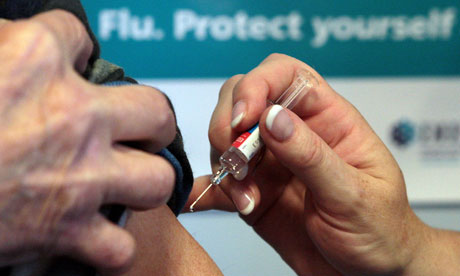
No one wants to get flu, especially not swine flu which is still around this season, according to the WHO global influenza surveillance centre. Influenza is caused by a number of viruses and the WHO centre identifies which ones are most likely to cause flu each year and makes vaccines to match them. This year's jab will protect against three types: H1N1 (swine flu), H3N2 and B. Flu usually causes a week or so of nasty symptoms such as a sudden high fever, dry chesty cough, chills, tiredness and joint pains as well as a sore throat and diarrhoea. But complications such as pneumonia (which can be life-threatening) can occur in certain groups of people. The Department of Health recommends the vaccine for everyone over 65, anyone over six months with heart, lung, kidney or liver disease, diabetes, neurological conditions (and some others), all pregnant women, people in residential homes, those who care for elderly or disabled people and health-care and social-care workers.
The dilemma: If you're not in the high-risk groups, you still might think you need a flu jab. But if you're pregnant, you might be anxious about how safe the vaccine is. You might think that because swine flu is more virulent than regular flu, the vaccine must be less safe in some way. You might think the flu jab will give you flu-like symptoms. On the other hand, you may be afraid a small child will cough flu virus all over you on the bus. Figures show that quite large numbers of people had the flu jab last year – nearly 40% of pregnant women and up to 75% of those over 65, but less than 50% of people with chronic conditions. Less than 40% of doctors had it. So can you be sure that you either should or shouldn't have it?
The solution: If you are not in a high-risk group you don't need the jab. The vaccine is not "live" (it's inactivated), which means you can't get flu from it and the only symptoms are likely to be a slight fever and sore arm. It is no less safe for protecting against swine flu – the vaccine is still inactivated whatever it has in it. According to David Salisbury, director of immunisation at the Department of Health: "In the US, it has been routine for some years to give pregnant women a seasonal flu jab and we were already on the way to deciding whether pregnant women should be vaccinated before the swine flu pandemic." So, regardless of swine flu, all pregnant women should have the flu jab. Swine flu increases the risk of dying for a pregnant woman seven times above the usual risk but, Salisbury says, the real decider is evidence the jab protects the baby too – for the whole of that season.
If you had a jab last year you still need one this year. It takes up to 10 days for the vaccine to work and for your body to produce antibodies to protect you from the flu virus. So if you are in a high-risk group, what are you waiting for?

